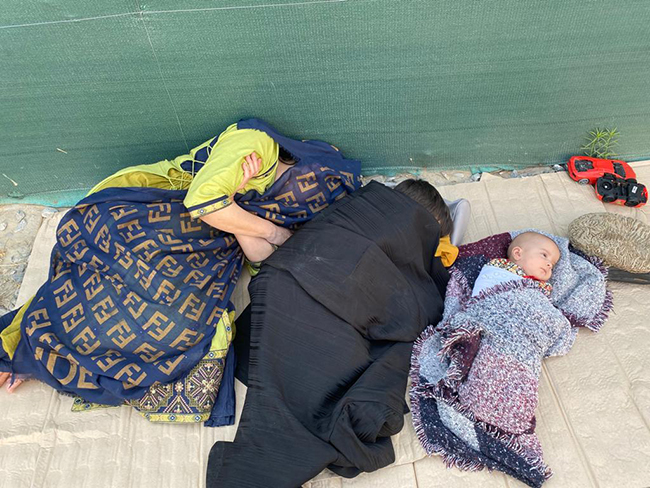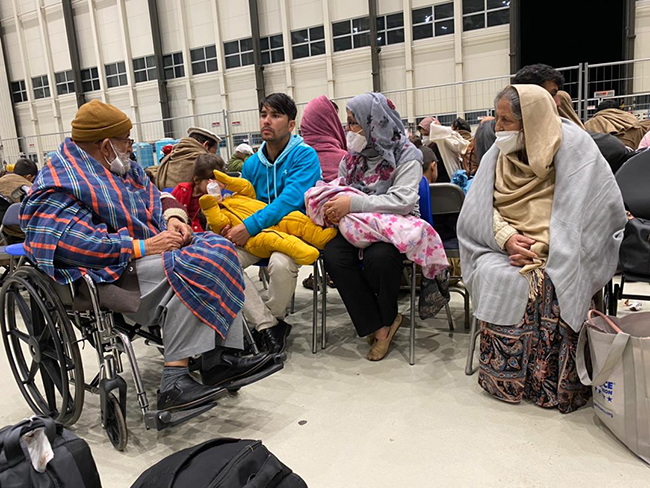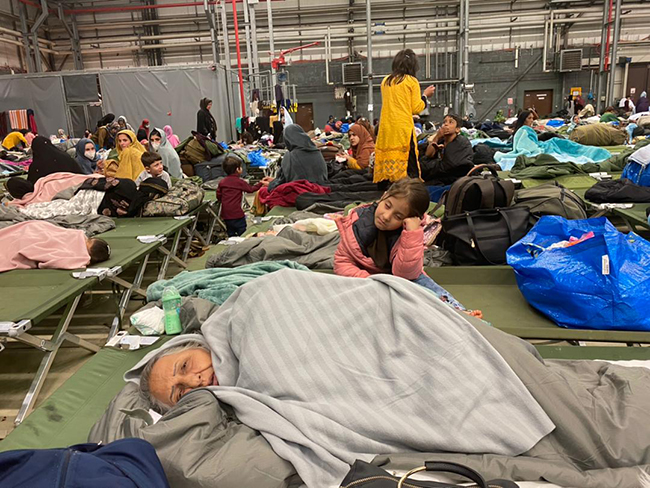Nabila’s journey, part II: ‘Don’t open the door for anyone’

(L-R) Nabila Painda’s sister-in-law Merman Sadna Shamim sleeps alongside her son Sohaib Shamim, and Painda’s daughter Malika Sama at the Kabul Airport in Afghanistan in late August, 2021, as they await permission to board a plane to Qatar. Photo/courtesy of Nabila Painda
By Nabila Painda | Special to the Courier
Last week in “Nabila’s journey, part 1: ‘A woman’s place’” we learned of the author being forced to flee her native Afghanistan when the Taliban gained control in 1996. She returned in 2001 and began working to advance the education and rights of women. In August 2021, the Taliban re-established control of Afghanistan. This week’s installment, “Part II: ‘Don’t open the door for anyone,’” resumes then, immediately after a Taliban soldier told her, “If you don’t want to die, go back home; a woman’s place is at home.”
Terrified, I rushed home, trembling, hearing the palpitations of my heart. I locked the door, contacted my husband, andexplained the situation to him with a choked throat and a quivering voice.
“Stay calm, Kabul has fallen,” he told me. “The Taliban are inside Kabul. Don’t open the door for anyone. I’ll try to get home as soon as possible.” Along with my three children and parents, I stayed locked in the house until my husband reached home nearly four hours later.
My husband and I, our three children ages 5 years, 18 months, and 3 months, my mother, and my 80-year-old disabled father spent the next eight days locked in our dark house. Then, with the help of an American woman with whom wehad earlier collaborated, we received a letter from a U.S. Congressman. The letter made it possible for us to leave Afghanistan and seek refuge in the United States. It instructed us to go to Kabul International Airport. But we knew from news reports that the airport was unsafe, with the risk of encountering Taliban soldiers excessive.
Fortunately, and with great effort, the American woman who had been helping us was able to arrange a secure car to transport us to the airport. At 6 o’clock the evening of August 22, 2021, we left our home, locking the door in a way as to not to attract attention.

(L-R) Nabila Painda’s father Sayed Sadat, daughter Malika Somaia (in red), daughter Malika Saba (in yellow), husband Masoud Painda, daughter Malika Sama (with pink blanket), the author, and mother Merman Shaima Sadat at the Munich Airport in Germany in late August 2021, waiting on a U.S. military transport plane that would take them to the United States. Photo/courtesy of Nabila Painda
Normally, a trip to the airport would take 30 minutes. On this day it took more than 10 hours. Our driver was forced to constantly change his route through less traveled roads in order to avoid Taliban checkpoints.
When we arrived, the airport was surrounded by throngs of people aggressively striving to get inside by any means necessary. The first time we approached the gate, people rushed in from all sides of our car, trying to get inside with us. The airport security officers then fired bullets over the surging crowd, bringing down a man in sky blue clothing. I saw this horrific scene with my own eyes and will never forget it.
Airport security pushed our vehicle back and told us we could not enter. Fear and trembling completely enveloped me. My heart pounded as it did 20 years earlier, when my mother fell to the ground after being struck by a Taliban soldier’s bullet. I had no hope of survival. I held my three children in my arms. My eldest daughter was extremely frightened, but I smiled at them and said it was just fireworks.
After three hours of waiting, a security officer told our driver it was safe, and finally, at 4:30 a.m., we entered Kabul Airport.
We thanked our driver, gathered our meager belongings, and waited for the plane that was to take us to Macedonia. But later, due to various issues, we were told we would not be able to travel on that plane.
Meanwhile, the airport was not safe. There was a constant threat of explosion, suicide bombings, or being targeted by the Taliban.
After two terrifying nights of waiting, we were able to accompany scores of other passengers crammed into the hold of a U.S. Army cargo plane destined for Qatar.

Nabila Painda’s mother, Merman Shaima Sadat with her granddaughter Malika Somaia and other Afghani refugees in late August 2021 at the Munich Airport in Germany, waiting to board a U.S. military transport that will take them to the United States. Photo/courtesy of Nabila Painda
After flying for a few hours, we arrived in Doha, Qatar. We waited inside the sweltering airplane with temperatures approaching 120 Fahrenheit for four hours. It felt like there was no oxygen. We were packed like sardines, with no room to even stand. The children were passing out, and the noise was deafening. There was an overwhelming number of migrants and very few staff members.
Finally, our turn came to disembark. We were transferred to a shelter resembling a large shop that could accommodate a little more than 100 people. However, there were more than 700 of us crammed inside. We were given two meals and managed to take a shower.
Up until about 8 p.m., the atmosphere wasn’t too bad. But then a group of about 100 military personnel arrived. I thought they may had been fighting in the mountains for years and had never seen a city. It was plainly evident from their appearance that they had never encountered unveiled women before, as they stared at us in astonishment. A strange fear gripped my heart; I thought at any moment they might harm me or my children. Sleep vanished from my eyes, even though I hadn’t slept the two previous nights in Kabul Airport.
Eventually I was able to speak with an American woman who seemed to be in charge. I told her about my work and my mother’s situation, of my children who were delirious from the heat, and my father who couldn’t breathe properly. She promised me we would be among the first ones to leave the following day.
Where we were going, I did not know. I only knew that it wouldn’t be Afghanistan, and we would be out of the overcrowded building.
My parents awoke at 4 a.m. the next day. My father wanted to perform ablution [the washing of one’s body or body parts as part of a religious rite] and pray. I asked my mother to watch the children so that I could help him. When he stood, I noticed that a group of about 100 people who had been standing in front of the exit from night until morning were preparing to depart. A U.S. military officer was guiding them. I quickly went toward the officer and told him about the promise made to me by the American woman, whose name I unfortunately could not remember, that we would be among the first to leave. But he’d not been told about the arrangement. I didn’t give up. I explained the situation of my frail father and young children to him. Noticing my anxiety, he told me to bring my family. I hurriedly gathered my father in his wheelchair, then woke the rest of my family up from their sleep and went to the door. The officer allowed us to leave first!
I expected we might be transferred to a private room or hotel, but we were returned to Qatar Airport, where we boarded a Qatar Airways plane. I asked a stewardess about our destination, and she said Germany.
After a five hour flight, we arrived in Munich. Hours of customs procedures, more waiting, and still more paperwork followed. We were eventually transferred to a nearby U.S. military base. There we were separated by sex. There was a large tent for the more than 1,000 women. The men were placed in individual tents of 10 to 12.
It was winter, and though nighttime temperatures dropped to -10F, we only had summer clothes. My father caught a cold and had a high fever. My mother and I sewed jackets for my children and father from blankets. The bathrooms were very dirty and essentially unusable. The food was barely edible. In the first 24 hours, I ate only a boiled egg. Officials told us they had limited supplies as the number of people at the base had far exceeded their expectations.
After five days and nights in Germany, we boarded another plane. This one was headed to America. Forty-eight hours later we arrived at Philadelphia International Airport. It was August 30, 2021.
Exhausted and hungry, we were ready to start our new lives.
Nabila Painda is a Claremont Unified School District para educator and native of Afghanistan, where she was a high school principal.
Part III of Nabila’s journey, “Starting from scratch,” will be published in next week’s edition.







0 Comments